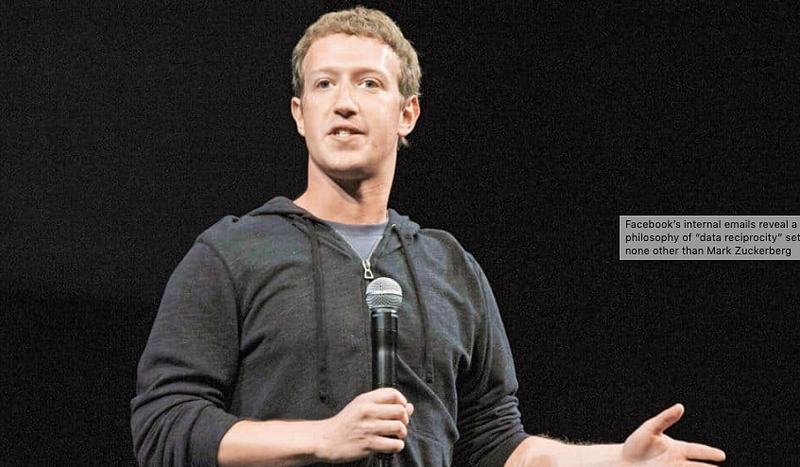When 2018 ended with data breaches and malpractices, it signalled some new year resolutions in India

A New York Times investigation has revealed that Facebook granted several online platforms access to their user data. This was done without the knowledge of its users and even their contacts. These arrangements were negotiated with the knowledge of top management. Such deals even permitted third parties to access private messages. We can be sure that more revelations will be made as Facebook has not only been leaking user data, but now under regulatory pressure and investigative reporting is finally disclosing its operational practices.
For instance, the latest scandal comes only a few days after a committee of the UK Parliament revealed internal Facebook emails which documented unethical, and downright creepy behaviour. They set out the governing philosophy of, “data reciprocity” set out by none other than Mark Zuckerberg in an internal email. It documented the use of a smartphone application that monitored the device usage patterns and reported them back to Facebook. A specific slide had a chart mapping these trends specific to India. All of this again was done without proper knowledge or consent of users purely for Facebook’s commercial benefit, arguably even leading to its acquisitions strategy.
The underlying reason for these continuing scandals is manifold, but this problem shares three common issues that go much beyond Facebook. While it is the most problematic and powerful many others share these traits. Let us also be clear, that these are broad generalisations and many notable examples break from these trends. Any criticism here is towards a dialogue of learning to better serve technology innovations that provide value and comfort to millions of Indians.
Lack of respect for users
The first is very easy to spot. There is a lack of respect for the rights of users. This is because users are not viewed as individual human beings, but integers and aggregates, referred in pitch decks across the buzzing technology industry, as “user base”, “active users”, “number of downloads”. The product design is maximised towards growth and profit and in the service of shareholder value, fundamental rights or ethics seem as romantic ideals only fit for human rights defenders. Hence, retaining a users attention, the collection of personal data and targeting them with advertising is more important than caring for their mindfulness and privacy.
When public scrutiny is visited, teams of lawyers, publicists and policy professionals service ex-post remedies or justifications. They often lack independence and power in the decisions made within companies. This needs to change in organisational processes with the necessity to build collaborative models between managerial, engineering and legal teams for an impact assessment on individual rights.
Regulation is evil
The second premise is an organisational resistance within some technology companies to state systems which derive from neo-liberal ideals of a laissez-faire efficiency. It is not out of place for start-up founders to describe their mission with the enthusiasm and overconfidence that is necessary to build the wonderful innovations loved by millions. This, unfortunately, also casts a long shadow.
There is an underlying ambition to profit by posing radical change, most closely captured in phrases such as, “disrupt”, “hustle”, “leapfrog”. When such changes occur, companies often build operational monopolies and derive incredible power in specific segments and markets. At the same time, they continue to view regulatory compliance as a check-box which serves little, to no public needs. With the increasing physicality of digital services, their close integration with systems results in tangible, deep harm.
They visit in a spectrum of manifestations from issues of contract labour and the gig economy to financial systems which are open to frauds and lack consumer safeguards. We cannot continue racing on the track of innovation without regulatory seat belts which hurt not only users but even companies. Sustainable and positive growth is only possible with a better dialogue on devising regulation, not evading it.
Government is no less guilty
The third and final trend is the role of the government. From privacy to misinformation, the government not only lacks institutional capacity and expertise but further compounds these problems by advancing demands to gain control and power. At the same time, it also adopts policies which completely erase user protections to advance economic interests of local startups. For instance by breaking end to end encryption as it has repeatedly attempted the Indian Government undermines user privacy. In addition longstanding attempts to reintroduce harsh criminal laws or undermine the intermediary liability protections keep being mooted that will be used to target political criticism.
At the same time, the design of many policy documents or regulations there is growing opacity and devaluing experts from the academies, civil society and digital rights communities. At cynical moments, one can almost imagine each policy document and regulation is a growing power grab from technology companies, especially global platforms to the government in the interests of surveillance and censorship. This needs to stop with a positive articulating starting with a strong, user-centric privacy law.
The path for the new year
At this moment, the views and analysis will be faulted by many who champion the excelsior of innovation. It may even seem the opinion of a Luddite, but it is an inescapable conclusion that despite the growing number of people using the internet in India, there is also a growing decrease in trust for Facebook. We should go beyond blaming Facebook, or its users.
We should certainly demand accountability from it and investigate it thoroughly. But this is only a start and there is a need to look beyond it. If the data scandals of this year and have taught us anything, it is we will profit by the enduring trust of users by respecting their individual rights. After all, it is good for business.
(A version of this article was published in the Hindustan Times on Dec. 26, 2018).